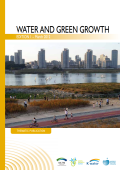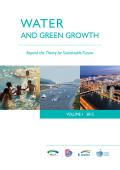Produced by the United Nations Environment Programme (UNEP), in collaboration with Tongji University, this Chinese-language textbook aims to inform China’s economic structural transformation and its move towards ecological civilization. It involved 21 authors from 10 national and international institutions, covering the theoretical, sectoral and policy dimensions of green economy with a specific focus on key issues of relevance to China. This book is supported by illustrative examples tailored to a Chinese audience and provides a systematic understanding of the inclusive green economy concept and its linkage to the Chinese concept of Ecological Civilization.
China’s economy is undergoing a major structural transformation towards a new development model focused on achieving better quality growth that is more economically and environmentally sustainable, and achieves better social outcomes for the Chinese people. This paper traces the origins and explains the content of this new growth model, and considers its likely implications for the trajectory of China’s greenhouse gas (GHG) emissions. In so doing, this report can contribute to an important policy debate concerning the future direction of China’s economy and its role in responding to global climate change.
China’s central bank, the People’s Bank of China, has launched a ground-breaking report that sets out in specific and practical terms an ambitious agenda of how China can green its rapidly developing financial and capital markets.
The report, entitled “Establishing China’s Green Financial System”, is the outcome of a Green Finance Task Force which was tasked to develop policy, regulatory and market-innovations that would better align China’s financial system with the needs of green industry and sustainable development. The Task Force was co-convened by the Research Bureau of the People’s Bank of China (PBC) and the United Nations Environment Programme project Inquiry into the Design of a Sustainable Financial System (`UNEP Inquiry`).

This report is the first major output of a project on Water and Green Growth, led by the Government of the Republic of Korea and the World Water Council (WWC). It is the result of over 12 months of research and analysis by an international group of experts. It provides an analysis of 26 case studies that illustrate various aspects of water and green growth, and then uses the analysis to recommend a draft framework for policymakers.

This report was launched at the 7th World Water Forum in Daegu, Gyeongbuk, Republic of Korea. It presents the research conducted from 2011 - 2014, a new theoretical approach, a revised analytical framework and recommendations for policy makers to begin the process of implementing water and green growth strategies. The report provides a recap of the history and rationale behind the development of the Water and Green Growth Project and concept. The analytical framework used in the report has been developed through numerous discussions between experts in various fields and encompasses strategic, institutional, and practical approaches.
